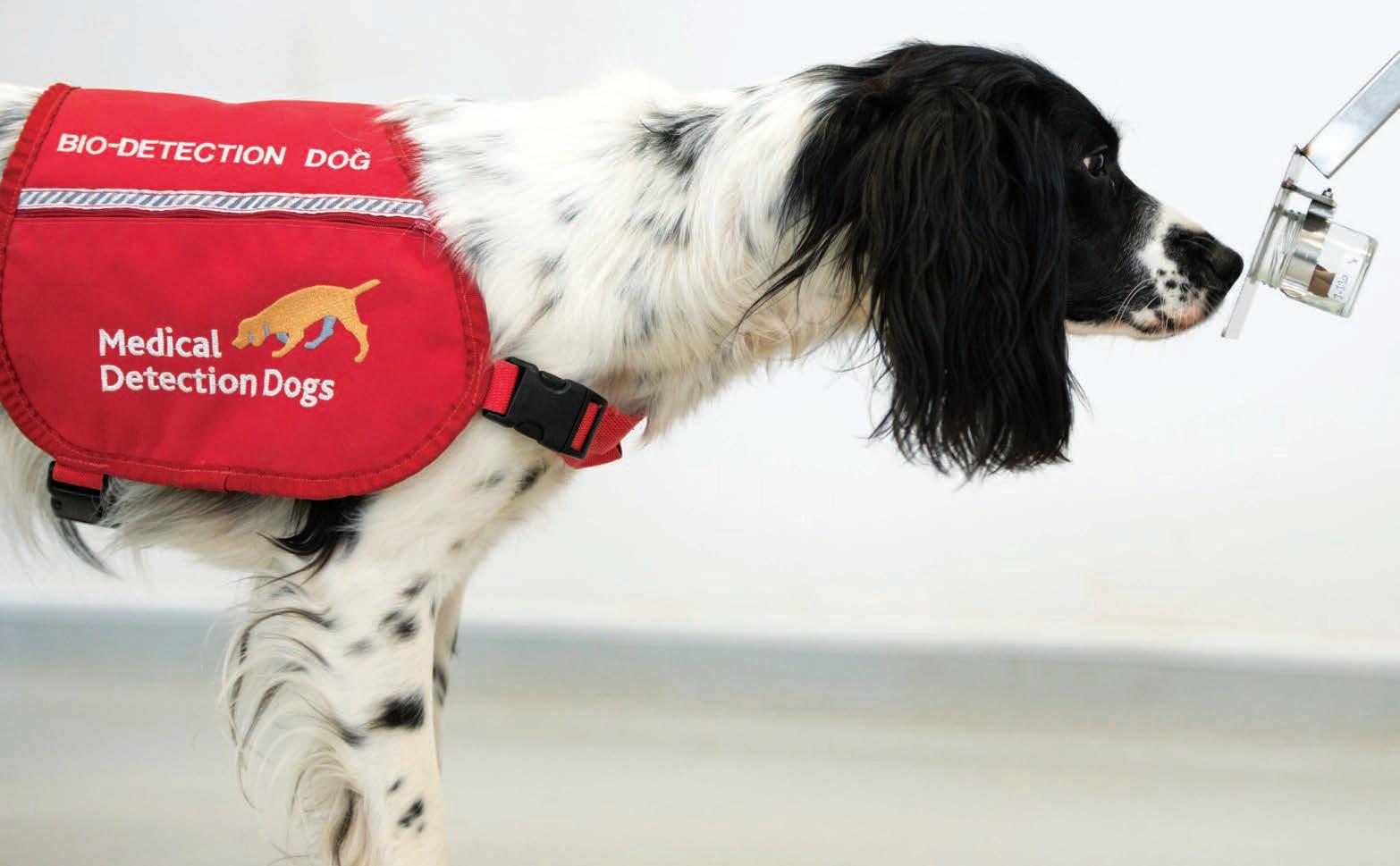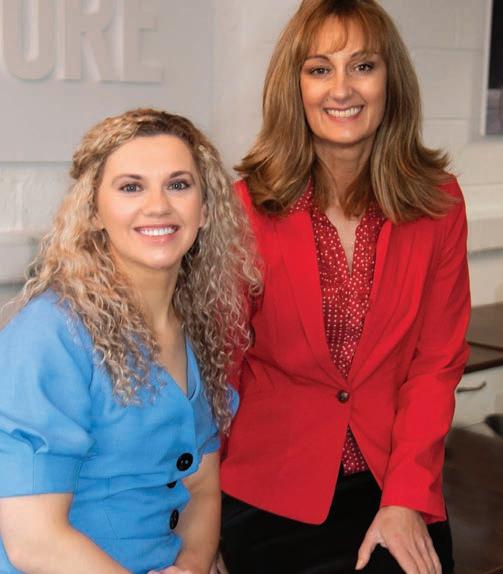
11 minute read
Covid news
Photo: Bex Arts

Advertisement
Can dogs be trained to sniff out Covid?


BY LINDA GEDDES
NOSE and throat swabs have been the go-to method for diagnosing Covid-19 since the start of the pandemic. But the latest diagnostic weapon requires no laboratory equipment: just a leash and a pocket of doggie treats.
Dogs have up to 300 million olfactory receptors in their noses, compared to our ve million, making them supremely sensitive to scent. Over the past two decades various studies have suggested that they can distinguish between healthy individuals and those with various types of cancer, Parkinson’s disease, and hospital acquired infections such as Methicillin-resistant Staphylococcus aureus (MRSA). One recent study also suggested that dogs could detect asymptomatic malaria infections in children with 73% reliability, by sni ng their used socks. Various countries are now investigating whether dogs could similarly be used to detect people who are infected with coronavirus, with some early clinical trial data suggesting that they can.
Although dogs are still not as accurate as PCR tests for COVID-19, they have the advantage of speed.
In the case of cancer, scientists have established that changes in certain cellular proteins during tumour growth can trigger chemical reactions in the membranes that surround cells, releasing gaseous compounds that can be detected on people’s breath or in their urine.
However, for coronavirus, and other viral or bacterial infections, it is unclear whether the dogs are detecting the scent of the pathogens themselves, or changes they trigger in our bodies when we are infected.
It takes around eight to ten weeks to train a dog to detect coronavirus. e dogs are initially trained to detect a non-biological target scent, and to indicate when they have found it, using their own unique “tell sign”, eg sitting down or wagging their tail. ey are rewarded with an edible treat or toy for correctly indicating a positive sample or correctly ignoring a negative one.
Once they’ve mastered these basic principles, the dogs are trained using clothes or face-coverings worn by people who had tested positive, and negative for Covid-19.
Gun dog breeds such as Labradors, Golden Retrievers and Spaniels make particularly good medical detection dogs. Not only do they enjoy the “game” element of searching out scents, but they also tend to be temperamentally wellsuited to working with humans in public places.
Two recent studies have suggested that dogs can distinguish between clothes or sweat samples collected from infected and noninfected individuals with a high degree of accuracy. In one study, researchers at the London School of Hygiene and Tropical Medicine and Durham University in the UK, together with the British charity Medical Detection Dogs, found that dogs could rapidly, and non-invasively detect Covid-19 with up to 94.3% sensitivity – meaning that they would correctly identify 94 out of every 100 infected people. is compares with a sensitivity of 97.2% for PCR tests, and 58-77% for rapid lateral ow tests. e dogs were also 92% correct in identifying negative samples, the research suggested. e study involved 3,921 adults, with odour samples collected from 1,097 infected and 2,031 uninfected individuals.
In the second study, researchers led by Dominique Grandjean at France’s National Veterinary School in Paris found that trained dogs were able to detect the presence of the virus with 97% accuracy, and were 91% correct in identifying negative samples. 335 people and nine trained dogs were involved in the study, with 109 people found to be COVID-19 positive via a subsequent PCR test.
However, neither study has yet been peer-reviewed, and further research is needed to con rm that dogs can achieve the same degree of accuracy when presented with infected humans in real-world settings such as airports, rather than scraps of fabric in laboratory conditions
Training dogs takes time, and there would never be enough dogs – or handlers – to screen entire populations. Where they could be more useful is at public transport hubs, such as airports, where they could rapidly screen disembarking passengers – particularly those arriving from high-risk countries – much as trained drugs and explosives sni er dogs already do.
Article from gavi.org.
Seasonal Covid and u booster vaccine plan
SPEAKING at the World Economic Forum (WEF) on Monday, Moderna CEO Stéphane Bancel said his company planned to offer a seasonal booster shot that would cover Covid-19 as well as other respiratory illnesses like u and respiratory syncytial virus (RSV), reports euronews.com.
“Our goal is to be able to have a single annual booster so that we don’t have compliance issues where people don’t want to get two to three shots a winter, but they get one dose where they get a booster for corona, a booster for u and RSV,” Bancel said.
But Bancel also suggested that the issue of vaccine inequality could continue, saying of the estimated 2023 introduction for the combined booster, “I don’t think it will happen in every country”.
Also on Monday, P zer CEO Albert Bourla suggested that the current wave of Omicron could be the last of the Covid-19 pandemic to require restrictions on work and social life.
“ e most likely scenario is that the virus will continue to circulate for a number of years. It’s a virus that has spread throughout the entire world and it’s very di cult to get rid of it,” he said.
Catching a cold can protect against Covid - but you should still get a vaccine, say researchers
“But I think that with the tools science has given us, this wave will be the last to bring with it these kinds of restrictions”.
In comments to French broadcaster BFMTV, Bourla echoed Moderna boss Bancel’s opinion that annual Covid-19 vaccinations would be a fact of life for years to come.
“For me, the important thing is to make three doses a complete vaccination, followed by an annual dose, except for immunocompromised people who could receive a booster every four months,” he said.

Could you be the next Grow with Aldi winner?

ENTRY for the Grow with Aldi 2022 programme closes today (Friday). e supermarket is looking for business innovators; the bold, the brave, the fearless and the future thinkers who want to get to the next level.
Whether you are an artisan cheese supplier, adventurous chilli chocolate connoisseur or innovative baker, Grow with Aldi could be the programme for you.
Grow with Aldi is a supplier development programme helping the very best small to medium sized Irish suppliers in building their brand. e mentor scheme is undertaken in conjunction with Bord Bia, and Aldi want to champion those game changing, risk taking creatives and trendsetters that produce top-notch Irish products and make them accessible for all.
Following strong success in recent years, the programme is now entering its fth year where food and non-food applicants can enter their product in January, face a judging panel in February and if successful, have their product launched in all 149 Aldi stores nationwide in May as part of the Grow with Aldi Specialbuy promotion. e adventure doesn’t stop there as from the Specialbuy bunch, up to six winners will be chosen and o ered further opportunities with Aldi. is will include mentoring and development through a number of workshops such as Buying Process, Supply Chain Management and Social Media Marketing, followed by a number of individual mentoring sessions with the Aldi Buying team, the Aldi Marketing team and Bord Bia technical experts.
Speaking about the 2022 programme launch, John Curtin, Aldi Ireland Group Buying Director, said, “We are now in year ve of the Grow with Aldi programme, supported over 200 Irish producers on this journey and invested over €5.5 million to make these longterm partnerships a reality. We are inviting producers to enter … and demonstrate their innovation and creativity in product development for an opportunity to win a 12month listing in all 149 stores nationwide. We can’t wait to see what amazing products we discover during this year’s programme.”
In 2021, 117 products from 63 Irish suppliers went on sale as part of the Grow with Aldi Specialbuys events in June and November. Having been highly commended by the judging panel, e Fig Tree restaurant from Kilkenny was one of just six producers to secure the opportunity to become a core or seasonal range listing in Aldi stores. Fig Tree’s Honey & Cayenne Dressing and Original House Style Dressing launched as an Aldi Specialbuy on September 23, 2021, and is due to return to shelves for a six-month period in April this year. e other ve producers were: Cookie Dó (Tallaght, Co. Dublin), ChanChan (Firhouse, Co. Dublin), Wood re & Green (Sandyford, Co. Dublin), Vanilla Bean Patisserie (Ballinagh, Co. Cavan) and Blackcastle Farm (Blackcastle, Co. Tipperary).
“Now in its fth year, the success of Grow with Aldi is a testament to the fantastic quality of food and drink products being created by local Irish suppliers,” said Gillian Willis Bord Bia Small Business manager.
“Recent research from the Bord Bia inking House has shown that more and more Irish consumers are making conscious decisions to buy locally sourced products, so having the Grow with Aldi programme support some long-term success stories plays an important role in showcasing the innovative products that we as a small nation can create. Bord Bia is proud to partner with a programme that provides new development and growth opportunities for its suppliers each year.”
Why not inject some ‘Adventure into your Venture’ this year and join the Grow with Aldi programme to utilise new opportunities, connections and take the next step in your business journey.
To register or nd out more about the Grow with Aldi programme 2022, visit www.aldi. ie/grow.
Pictured front row, far right, Thomas Clarke, The Fig Tree, High Street, Kilkenny was picked for the Grow with Aldi 2021 programme.
THE right to request a flexible work arrangement is set to become a reality this year for Irish workers as the EU’s Work Life Balance Directive must be implemented by the Government by October this year.
The EU Directive means that employees who are in a caring role such as parents or carers will have the right “to request” flexible work arrangements.
The new EU Directive will only offer employees the right to request flexible work arrangements but employers will not be under an obligation to grant the request.
Karen O’Reilly, founder of Employflex, said the Government now has a chance to lead the way in Europe when it comes to flexible work practices.
“This year the Irish Government must implement this new legislation from the EU on the right for carers and parents to request flexible work arrangements,” Ms O’Reilly said.
“If the Irish Government went a step further and opened this up to everyone in the workplace, not just carers and parents, this would be a real commitment to changing the flexible work landscape and help Ireland gain competitive advantage in the global war for talent,” she added.
Ms O’Reilly urged the Government to find ways that flexible work arrangements can work for everyone.
“If the pandemic has shown us anything, when it comes to work it is that workers are resilient and new ways of working can work for everyone. Work/ Life balance is so important and employers and employees must work together to ensure this is achievable,” she added.
Employflex is establishing a flexible work friendly database which will include flexible friendly workplaces. To obtain the accreditation, companies must meet nine out of 10 criteria which will be judged by the company.
“We want to separate the companies that are just paying lip service to their flexible work policy from the companies that are truly embracing a flexible work culture,” said Karen. “Hybrid and remote work are not the same as flexible work. Flexible work can be small but important gestures such as having an hour off in the morning and afternoon for school drop-offs or having an extended lunch break to care for a loved one. Flexible work can also be compressed hours, full time with flexibility, annualised hours, job share, term time and part time. We need to ensure Flexible Work is not just a luxury but a right.”
Flexible work to become a reality in 2022 Search is on for Texaco young artists 2022 Karen O’Reilly and Helen Walsh THE search to nd the young of Employflex. artists who will excel in this year’s Texaco Children’s Art Competition has begun. Last year two students from Co. Kilkenny won prizes in the competition, which is now in its 68th year and widely acknowledged as the longest running arts sponsorship in Ireland. Distinguished past winners include artists Dorothy Cross, Graham Knuttel and Robert Ballagh, fashion designer Paul Costello, broadcasters elma Mans eld and Terry Prone, ICTU General Secretary David Begg, novelist Clare Boylan, actress Jean Anne Crowley and musician Ethna Tinney. e closing date for entries is Monday, 28th February. Judging will take place in April with winners to be announced in May. Details are available at www. texacochildrensart.com or at Texaco service stations throughout the county.








